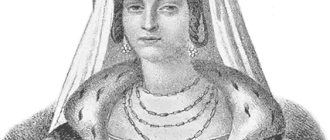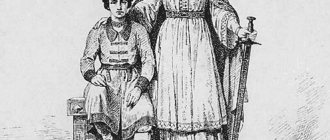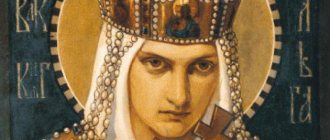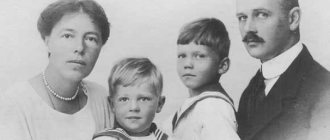If you look at Europe or Asia in the tenth or eleventh centuries, you will find that ruling by a woman’s hand was somehow not accepted. The world originally belonged to men who were stronger, braver, more decisive and easier to make non-standard decisions. Grand Duchess Olga, the wife of Prince Igor Rurikovich, who has not been taken seriously to this day, became the first and practically the only one who led such a large state as Kievan Rus. She did not lead her squad on destructive campaigns, did not conquer new lands and did not destroy cities and countries, but directed all her strength and energy to improving life within her state, for which she is remembered with gratitude even now.
Who is Princess Olga?
According to ancient chronicles, the girl was of peasant origin. Thanks to her positive qualities, as well as extraordinary wisdom, as a young teenager she was noticed by Grand Duke Igor and chosen by him as his wife. It so happened that for quite a long period the princely couple had no children. This fact contributed to the fact that Olga began to pray to the Christian God, and after a short time the couple had an heir. Thus, Olga was the first among the pagan people to accept Christianity and began to help spread it in Rus'. In a sense, the very fact of Olga’s decision to accept the Christian faith testified to her rationality and subtle intellect. Despite this, Olga's husband and son remained faithful to their pagan gods, who helped them in battles. Nevertheless, Olga’s actions had an important influence on her grandson, Prince Vladimir, who baptized Rus'. He also chose the Christian religion as the state religion.
The princess's rise to power
After the death of Prince Igor, his wife, Princess Olga, comes to power in Rus'. Russia has always been ruled by strong warriors, so Olga had a difficult task: she needed to prove her strength and show the whole state that she, too, was a strong person who was capable of ruling the country. In ancient chronicles you can find four actions of Princess Olga, which are of great importance for the development of Russian history.
The reign of the princess begins with revenge for the death of Prince Igor. This was the first act mentioned in the chronicles. As revenge, Princess Olga, together with her son Svyatoslav, burned the capital of the Drevlyans to the ground. During the fire, many Drevlyan ambassadors died. This act proved the strength of a woman, despite the fact that throughout the Russian state, a woman was considered a weak-willed creature who had to run a household and raise children.
But let's not go off topic. What is a lesson in Ancient Rus'? After completing her revenge, the princess decided to take up state affairs in order to eliminate economic and political problems in the country.
Accession to the throne
Princess Olga became a widow early: during the collection of tribute, Igor was brutally killed by the angry Drevlyans. Since the heir was still small, the princess herself ascended the throne.
The first thing she did was deal with the Drevlyans who executed her husband, sharply suppressing their uprising. After this, a period began during which the reforms of Princess Olga were implemented. During this time, structural changes occurred in the system of government. Olga’s main task was to prevent future incidents similar to the one that led to the death of her husband.
Relations with neighboring principalities
Olga's foreign policy deserves special attention. The table below contains the main deeds of the princess.
When the ruler improved the situation within Kievan Rus, she set about strengthening the international prestige of her country. Princess Olga's foreign policy was diplomatic, unlike her husband.
At the beginning of her reign, she converted to Christianity, and the Byzantine emperor became her godfather. These events contributed to increasing the authority of Kievan Rus among the rulers of other countries, because it seemed unrealistic to have such a person as a godfather.
Basically, Princess Olga's foreign policy was aimed at improving relations with Byzantium. And she did it well. For this reason, part of the Russian squad participated together with the Byzantine army in hostilities, while simultaneously maintaining the independence of their state.
In 968, Kyiv was attacked by the Pechenegs. The defense of the city was led by the princess herself, thanks to which it was spared the siege.
During Olga's reign, conditions were created that created the advantage of conducting a peaceful foreign policy over a military one, if such was necessary.
Innovations and transformations
What reforms did Princess Olga carry out? First of all, she took up the issue of collecting tribute, establishing an orderly system of taxation. Princess Olga carried out a reform, the purpose of which was to weaken tribal power by strengthening its influence. This event is described in the “Tale of Bygone Years” by Nestor: “And Olga went with her son and her retinue across the Drevlyansky land, establishing tributes and taxes.” Princess Olga's reforms began in 946.
Results and results of the board
Olga’s activities were appreciated by her descendants, which is not surprising if we briefly outline the princess’s main achievements:
- She took revenge on the Drevlyans for the death of her husband and forced them to pay tribute again
- Carried out a tax reform - established the timing, amount and place of payment of tribute
- The first stone buildings in Rus' date back to the reign of Olga
- Involved in the development of Vyshgorod and Pskov
- Spread the influence of the new faith, of which she became an adherent after baptism in Constantinople
- She traveled to Constantinople and was baptized there, strengthening the alliance with Byzantium.
- When the Byzantines demanded the fulfillment of the agreement on the provision of troops, Olga was our reason to save soldiers for the growing Svyatoslav.
- To promote Christianity, the princess turned to the German king Otto I for help, but the mission ended in failure.
The period of Princess Olga's reign became a stage in the strengthening of the ancient Russian state, laying the foundation for future expansion under her son Svyatoslav the Brave and grandson Vladimir the Baptist.
Section "Princess Olga"
The meaning of churchyards
Princess Olga's reforms did not end there. An important innovation was the establishment of graveyards. They were small centers of princely power. From now on, each administrative district acquired its own graveyard and camp where tribute was collected. Churchyards were also used for trade. Thus, the administrative reforms of Princess Olga contributed to the creation of territorial divisions that were under the authority of the prince’s governor and capable of repelling anyone dissatisfied with the policies and decrees of the princess. Later, by the 12th century, churchyards turned into district control centers.
Before Olga's reign, tribute collection was carried out in the form of a polyudya - an annual winter tour of the estates of government officials, during which tax could be collected twice from one household. Of course, this fact caused dissatisfaction and indignation among payers. However, with the introduction of graveyards, people who brought tribute received a special princely seal, which protected them from collecting the tax again. Olga carefully put this reform into action, gradually honing its mechanism. During the implementation of the new system, most local princes lost their power, and the independence of autonomous tribes was sharply curtailed. The work carried out by Olga did not receive publicity or enthusiastic reviews, but it was of great importance in the development of statehood.
Authorities in the ancient state
At this time, there was only one authority - the prince. The prince’s squad can also be called an authority. It was the princely squad that was the official body that collected tribute in Ancient Rus'. Naturally, the collection of taxes took place under the supervision of the princess. However, this authority of the squad is regulated in Russian Pravda. The squad received income, which was provided by the population. In addition, the population was obliged to provide any funds if the vigilante was on duty. Then another type of relationship appeared in the state, which was called “non-feudal-vassal”.
The bulk of the state's population were community members, that is, free peasants who were part of various communities. Since there was no land ownership, the treasury received revenues that brought taxes. The definition of the word “lesson” in Ancient Rus' of that time was still unknown. However, taxes were generally binding. Very harsh rules were applied for non-payment of taxes, including the death penalty.
Approval of tiuns
The next stage was the appointment of tiuns as tribute collectors at churchyards. Before entering the Old Russian state, the Eastern Slavs called the tiuns “cattlemen.” First of all, this reform testified to the development of commodity-money relations. Instead of livestock, the Russians adopted a special form of equivalent, reminiscent of metal money.
If we briefly list the reforms of Princess Olga, we can highlight certain aspects. This is the approval of lessons, the creation of graveyards and the appointment of tribute collectors. During her reign, Princess Olga carried out the first financial reform in Rus'. She established a fixed amount of tribute and the procedure for its collection. The meaning of Princess Olga's activities was to normalize duties, centralize Kyiv power, and weaken local (tribal) power.
In other words, the reforms of Princess Olga contributed to the fact that the tribute that was collected from autonomous tribes was replaced by the same flat tax, which was paid by the entire population. At the same time, the possibility of repeated collection from one payer was avoided.
Thus, the reforms of Princess Olga finally established the central power of Kyiv, streamlined the taxation system, and created an administrative division of the state. Later, Olga's internal policy was glorified by the people in legends and songs. Thanks to the introduction of the Christian religion, Olga was elevated to the rank of saint and became an equal-to-the-apostles preacher. Changes in the social, political, economic, and spiritual spheres made it possible to strengthen Rus'. Of course, this became the most important stage in the history of the creation of Russian statehood.
Domestic policy
While the empress was in power, peace and order reigned in Kievan Rus. The domestic policy of Princess Olga was closely intertwined with the structure of the spiritual and religious life of the Russian people.
One of her most important achievements was the introduction of organized points for collecting tribute, at which later, after the ruler adopted Christianity, the first churches and temples began to be built on the site of graveyards. Since then, the development of stone construction began. The first such buildings were a country tower and a city palace, owned by the empress. The remains of their walls and foundation were excavated by archaeologists only in the early 70s of the 20th century.
Princess Olga's domestic policy is inextricably linked with strengthening the country's defense. Cities then were literally overgrown with oak and stone walls.
Attempts to establish relations with the German Empire
Over time, friendly relations with Byzantium began to weaken, and Olga decided to find a strong ally. She chose Germany.
In 959, the princess sent a Russian embassy to Otto I with a request to provide priests for the introduction of Christianity in the Kyiv lands, as well as with an offer of friendship and peace.
He responded to Olga's calls, and in 961 several clergymen, led by Adalbert, came to her. True, they were never able to expand their activities on Kyiv territory, since at the end of her life Olga no longer had the same influence as before.
In 964, power passed to Svyatoslav, who radically changed the tactics of state policy. And, I must say, not for the better.
Olga (945 – 966)
After the death of Igor, the seemingly powerful state was on the verge of collapse. Igor’s wife Olga remained in Kyiv with her young heir, Prince Svyatoslav. The Drevlyans broke away from Kyiv and stopped paying tribute. However, the Russian elite rallied around Princess Olga and not only recognized her rights to the throne until her son came of age, but also unconditionally supported the princess.
By this time Princess Olga
was at the peak of her physical and spiritual strength. From the first steps of her reign, she proved herself to be a decisive, powerful, far-sighted and stern ruler. First of all, the princess took revenge on the Drevlyans for the death of the Grand Duke and her husband. She ordered the killing of the Drevlyan ambassadors who came to Kyiv to marry her to their prince Mal. Then she herself moved with the army to the Drevlyan land. The Drevlyans were defeated in the battle. A heavy tribute was again imposed on the vanquished. The unity of the state was restored.
But Olga asserted her power not only through cruel punishments and force. As an intelligent and far-sighted ruler, she understood that polyudye with its violence, sometimes with uncontrolled collection of tribute, caused discontent among people, and this threatened the very existence of the young state. And the Grand Duchess went for reforms. She changed the system of collecting tribute, starting from the Drevlyan land. Now the population paid tribute according to fixed norms. She also determined the places where the tribute was to be brought annually by the population itself. These were the so-called graveyards
.
There she was received by representatives of the princely administration and sent to Kyiv. Then Olga moved with her squad to other Russian lands and everywhere established new norms - they were called lessons
- and established graveyards.
This was the end of Polyudye and the beginning of an organized system of taxation in Russia.
The state has taken another step in its development.
Having established order within Rus', Olga turned her attention to foreign policy. She had to show that the times of unrest did not shake the strength and international authority of Rus'. In 957, she went to Constantinople at the head of a crowded embassy, which numbered more than a hundred people. The princess was received there at the highest rank. The Byzantine emperor, writer, and major diplomat Constantine Porphyrogenitus gave a dinner in her honor. During the conversations, the emperor and Olga confirmed the validity of the previous agreement concluded by Igor, as well as the military alliance of the two states. This alliance was now directed against Khazaria and the Arab Caliphate.
An important issue in the negotiations was the baptism of the Russian princess.
By the 10th century Almost all the large states of Western Europe, as well as some of the peoples of the Balkan Peninsula and the Caucasus, adopted Christianity. Some did this under the influence of Papal Rome, others - under the influence of the Byzantine Empire. Christianity introduced states and peoples to a new civilization, enriched their culture, and raised the prestige of baptized rulers. It is no coincidence that the peoples of Western Europe, who were baptized 300 - 500 years earlier than the peoples of Eastern Europe, overtook them in their development. But everywhere this process was painful, since it meant a rejection of the pagan religion familiar to the people. Olga understood that further strengthening of the country was impossible without the adoption of Christianity. But at the same time she understood the power of paganism and people’s commitment to it. Therefore, she decided to be baptized herself and thereby set an example for others. At the same time, she had someone to rely on. Among the merchants, townspeople, and some of the boyars, there were already many people who had converted to Christianity.
For Olga herself, baptism was not only a matter of politics, but also the answer to many questions of conscience. By this time, she had experienced a lot: the tragic death of her husband, bloody reprisals against her enemies. Sometimes we believe that all this passes without a trace for the human soul. This is not so - in adulthood, a person certainly takes stock of his life. He asks himself why he lived, what is his place in this life. Paganism sought answers to these questions in powerful natural phenomena, in the actions of the gods. Christianity addressed the world of human feelings, human reason and faith in the eternal life of the human soul, but on the condition that man on earth would be righteous: fair, humane, tolerant of people.
Olga took this path in her declining years. But she arranged the baptism in such a way as to bring as much glory as possible to her Fatherland. She was baptized in the Church of Hagia Sophia - the main temple of Byzantium. Her godfather was the emperor himself, and she was baptized by the Patriarch of Constantinople. From now on, Olga became a Christian according to the Orthodox, Byzantine model, in contrast to the Roman, Catholic rite.
After returning to Kyiv, Olga tried to persuade Svyatoslav to Christianity, but her son grew up an ardent pagan. He, like his entire squad, worshiped Perun and refused her. Alienation began between mother and son. Soon the pagan group removed Olga from control. Young Svyatoslav took full power. This happened in 962.
There is a historical tale that the ideal ruler for Princess Olga was the Roman Emperor Constantine. This cannot be proven, but the fact is that she was similar to him: just as intelligent, persistent, talented and completely ruthless.
Long regency
Olga was a de facto ruler, but not a de jure one. After the death of her husband Igor in 945, she became only a regent for her young son Svyatoslav. Some sources claim that he was 3 years old, but this is doubtful; one thing is important: he was incapable of independent rule. And the last documented fact of Olga’s participation in state affairs dates back to 968. At this time, Svyatoslav is no longer only an adult, but also a seasoned warrior, and his mother leads the defense of Kyiv from the Pechenegs while her son robs the Bulgarians.
Consequently, Olga was actually not only a regent, but also a co-ruler of Svyatoslav. This prince was not at all interested in the internal structure of the state and willingly pushed such matters onto his mother.
Carrot and stick
This is how we can characterize Olga’s attitude towards the internal structure of the country. She became a widow as a result. The prince became the first victim of tax evasion in our history - the Drevlyans took revenge on him for trying to collect tribute from them twice. But such actions undermined the prestige of the Kyiv authorities. And Olga, to begin with, decisively stopped them.
Chronicles tell horror stories of the “four vengeances,” with ambassadors buried alive, funeral participants slaughtered, and a city burned with the help of sparrows. Almost certainly this excess is on the conscience of the artistic imagination of the authors of the chronicles. But it’s a fact: Olga suppressed the resistance of the Drevlyans by force and put an end to their princely dynasty.
But then she did exactly the opposite. She established the exact amounts of the “uplift” (that is, per household) tribute. Thus, antics like the one that led to Igor's death were now excluded. For the convenience of collecting taxes and resolving local conflicts, places were organized near some settlements where tribute was paid and where litigation was resolved. It is characteristic that later the word “pogost” became synonymous with cemetery - one can guess how they were punished for offenses. But for those years it was the norm.
Successes of diplomacy
On the external frontiers, Olga preferred negotiations to force. It is known that she visited Byzantium (approximately in 955) and negotiated with the German Emperor Otto I. This should also include her adoption of Christianity - this was well received by foreign sovereigns.
This could only harm domestic politics. It is known that the Russians simply kicked out the missionary sent by Otto I. Son Svyatoslav responded to his mother’s offer to be baptized with a categorical refusal and stated that he did not want to become a laughing stock in the eyes of his own soldiers. Christianity was not persecuted in Rus', but the prince and most of his subjects considered the baptized “strange” and sarcastically teased them.









